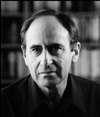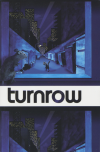
History
‘But the past was there, waiting for him, watching him.’
––Milan Kundera, Ignorance
On the sidewalks of the city I discovered
the walking numberless, a myriad gliding heads,
from each of which (an airship suspended above it)
there trailed a bubble by the flimsiest of threads.
Its envelope might be cloudlike, wavelike, round,
or cleanly rectilinear; every balloon contained
a moving picture, a fragment denoting sound,
or a sentence scrolling forward. It maintained
its floating fixity atop each hurrying figure
(bobbing a little in momentum’s drag) ––
yet when I frown to make sense of the design,
it shimmers from my gaze, or something bigger
on the street distracts . . .
No one can translate another’s flag:
I can scarcely, in the mirror, decipher mine.
Dysphoria
Catching a tram, Kezelco ponders the hazards of daily living. This century’s already looking a trifle shaky. The headlines, riddled with desperate puns, so bent on parading their tedious wit, are a symptom of the guilt, he speculates. The medium is smirking at the message; how modern. Yet the message terrifies. Kezelco still can see the unthinkable smoke pouring from Manhattan’s twin totems, hear the roar of the Balinese inferno, touch the hot twisted steel of Madrid. Opening his broadsheet, he jostles a youngish neighbour, drops a sorry, the girl half-grunts, impaled on her lurid mag. He sinks into print: the mantras whisper through his fingers like a rosary: Kabul, Kashmir, Baghdad, Jerusalem, Gaza . . . Elbow glued to his side, he flicks to the features. The editorial leads with asylum-seekers, follows with a tilt at the World Cup. A columnist chortles over traffic-jams and road-rage on the bridge. Another slams the onslaught of computer sex. A third embarks on date-rape, drug abuse. Kezelco skims the Letters chequerboard: today the closet-minded trump the unqualified, and one correspondent would abolish the mobile phone. Kezelco glares at the pedestrians marionetting past. There are things he will never understand––the economy, reality TV. He asks himself how safe he can really be, riding a tram through the heart of a bristling map. The surly maiden rears like a diver, rips at the cord. He returns to the nearest fold. A coloured diagram catches his eye. He studies a graph of the hole growing in the sky.
Honest
Like a poet revered but anonymous, Kezelco quite easily could cheat but has vowed to remain honest and faithful. He searches his memory for the start – he can reasonably recall telling lies: that sudden necessity, the circumstantial buzz. Certainly at school, where he lied to protect himself, and doubtless later too. But then, he can also recall squashing insects at the kitchen window of his mother’s flat. Or, when the folks split up, taking out his pain on a blameless labrador down at the canal. These days he wouldn’t hurt a fly – and they might laugh, but he’s been known to rescue every ultimate ant before rinsing the cakeplate clean. When had the change set in? What had reversed the heart of a smart if undazzling youth of median scruples, turning him into a micrologue, a stickler who can agonize for days over the misprecision of an over-ripe or accidental word, until he’s dredged the conversation up again––dripping with soggy weed––to refloat the flaw? What can outsiders think? But that’s the thing: Kezelco doesn’t care. What counts is a Clean Conscience; hence an honestness integral as the eyes, even at the price of pride. That’s not to say he’s incapable of stretching the line ––take that evening in Marseilles, when he didn’t reveal their real name to the concierge; or the fake American voice he copies in cabs. Would Kezelco commit untruth to preserve an ant? He knows he’d readily lie to save his own life.
Mission
When he arrived there was hardly anyone about. It was the dreary main street of a nondescript suburb within a city noted for its blandness. He took up a position in the civic square, began to speak, but the few passers-by who bothered to notice ignored the rantings of yet another zealot, so commonplace here of late. He needed a larger forum. At the intersection of Broadway and 42nd the throngs were endless, but oblivious. It was the same around Place de Gaulle, they spun by with barely a swivel. On the Plaza de Mayo there was no hope of attracting attention. Outside the Kremlin was gloom, a total absence of interest. On Tienanmen the police waved everyone on. In Trafalgar Square only the thin pigeons listened. At Bennelong Point the youngsters laughed and gestured. In New Delhi, Johannesburg, Jakarta, impossible to get a word in. He took stock. Maybe a more sharply targeted approach? But inside the Masjid al-Haram, around the Kaaba, the crush of the faithful was deafening. In front of San Pietro they were all too preoccupied taking pictures. The Kotel, at the foot of the Temple Mount, was a wall of impenetrable supplicants. He was close to despair, or a demeanour to that effect. He ascended the great golden Dome, arms upraised in salutation, a thousand colours rainbowing the sky. His voice boomed out. The pilgrims, their eyes dazzled, scattered, afraid of a terrorist attack. Angry now, He decided on a small show of force.
Numeromania
“Can you count?” my father used to say. “Then don’t count on it!” But I always have, I do. I count the spaces between the spokes of hubs; plums on a plate, the final cherries in the shallows of a dish, an olympiad of apples huddled in a bowl; spilt beans (though seldom jellies in a coloured jar); the numbered pages of books, not neglecting all non-arabic prelims; my blessings; my situps on the bedroom rug; the lines in a poem, especially tens and fourteens; the words of an autograph on any given sheet; the rows ahead of us in the concert-hall; the minutes and seconds of a song; the airbrushed magazine-moments at a medical appointment running late; any deficit short of the nearest ton; twelves, and multiples of six and forty-eight; the movements in a mass, the dances of suites; the steps of a monument I need to climb. I study billboards, shopsigns, the sides of trams; I zebra-cross in time to metronomes of green; outwait the red behind the wheel by waiting for the flashes of the car in front and my own clicks to coalesce; compute the sums of numberplates, the tallyings of addresses and phones; I add together (maybe my cardinal sin) the alphabetic values of the letters in a word or name, totalling up the digits, and then again, till the mystical Quersumme is attained. Periodically I calculate my son’s guitars. One day I’ll take the plunge and count the stars







